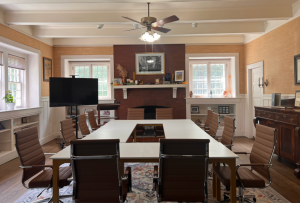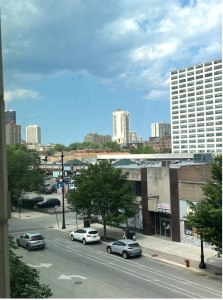 I spend most of my days working inside the Historic Barker House sitting at my desk with my
I spend most of my days working inside the Historic Barker House sitting at my desk with my
computer. When I had originally thought about working at an environmental non-profit I had
imagined myself spending most of my days outside. I never would have thought that I would be
sitting at a desk. However, in order to have the nature that I long to spend my time in, there
needs to be people doing the desk work.
Over the past month I have spent most of my time sifting through member data, making sure
data is transferred over properly, and emailing members to make sure their information is up to
date. This is important work, because in order to help preserve and advocate for the Dunes we
need financial support and these memberships are one of the ways we progress toward that.
There are multiple tiers of membership depending on the monetary donation members choose
to give yearly. Members gain access to certain privileges such as special events, advocacy
updates, and opportunities to interact with the staff that have helped shape the organization and
its mission to protect and advocate for the Indiana Dunes and Lake Michigan.
When I started my time at Valpo I was convinced that I was going to be a Park Ranger. I had my
heart set on this plan at 11 years old and did not see myself having any sort of job that entailed
spending my time at a desk. While at Valpo I fell in love with philanthropy and advocacy, through
the student org I was involved with, SALT. Park Ranger and philanthropy felt like two very
separate paths that I would never be able to mix. After getting placed at Save the Dunes I
quickly realized that my interests and knowledge that I had collected through the past few years
had all merged together into this opportunity. I have found a path that allows me to express my
knowledge and interest in the environment while also feeling fulfilled and helping impact others
through helping to preserve a space for many generations to come.
I, as well as many of my classmates at Valpo, have expressed feelings of anxiety and confusion
about their future in the last year. While this is a common feeling for college students, it has
been amplified among my environmental cohorts with all the changes in priorities with the
changing of government officials. There is, understandably, a common school of thought that all
environmental justice work is done outside, in the fields, forests, and with the flora and fauna,
but in a world and country that is experiencing whiplash the way my peers and coworkers have
felt in the past year in regards to the care of the environment, there is so much that can be done
online as well. As much as I’d like to subscribe to the “all environmental work is done outside”
way of thinking, seeing the way that I can communicate with members of my community who
care about the Earth as much as I do and help preserve the space I’ve especially come to love
here at the Dunes has given me a jolt of energy and rejuvenated my sense of hope for my
community.
Emma Depa, Save the Dunes
 It’s been a month since I started at Heartland Alliance, and I’m so thankful for the experiences I’ve had and everything I’ve learned so far! Since completing my training, I have started working with some participants within the Refugee and Immigrant Community Services program. Some of my responsibilities when working with participants include reaching out to each participant and talking to them about their current employment situations, searching for jobs that participants are eligible for/interested in, and helping participants apply for jobs. If a participant gets a call-back for an interview with a job placement, it is also my responsibility to accompany them to the interview, if necessary. Each time that I interact with a participant, whether that’s over the phone or through messaging or in-person, I also have to file case notes. As I’ve started getting to know each situation and learning about how I can best serve the participants that I’ve been assigned, the case notes have been very helpful. I can go back and read case notes from people who have previously interacted with/assisted my participants, which has helped me know how to move forward and continue communicating with the participants in an effective way.
It’s been a month since I started at Heartland Alliance, and I’m so thankful for the experiences I’ve had and everything I’ve learned so far! Since completing my training, I have started working with some participants within the Refugee and Immigrant Community Services program. Some of my responsibilities when working with participants include reaching out to each participant and talking to them about their current employment situations, searching for jobs that participants are eligible for/interested in, and helping participants apply for jobs. If a participant gets a call-back for an interview with a job placement, it is also my responsibility to accompany them to the interview, if necessary. Each time that I interact with a participant, whether that’s over the phone or through messaging or in-person, I also have to file case notes. As I’ve started getting to know each situation and learning about how I can best serve the participants that I’ve been assigned, the case notes have been very helpful. I can go back and read case notes from people who have previously interacted with/assisted my participants, which has helped me know how to move forward and continue communicating with the participants in an effective way.